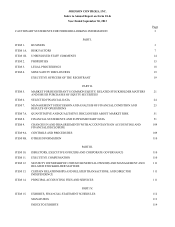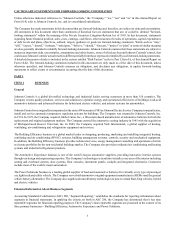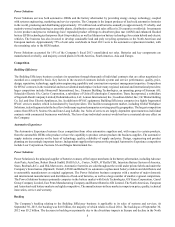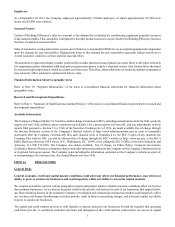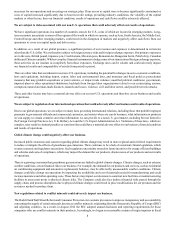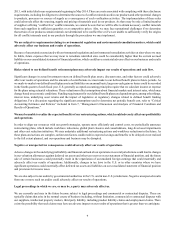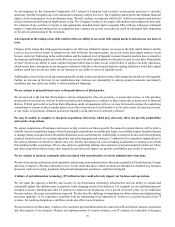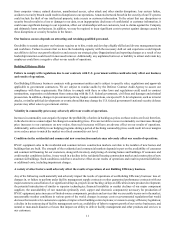Johnson Controls 2013 Annual Report Download - page 12
Download and view the complete annual report
Please find page 12 of the 2013 Johnson Controls annual report below. You can navigate through the pages in the report by either clicking on the pages listed below, or by using the keyword search tool below to find specific information within the annual report.
12
Automotive Experience Risks
Conditions in the automotive industry may adversely affect our results of operations.
Our financial performance depends, in part, on conditions in the automotive industry. In fiscal 2013, our largest customers globally
were automobile manufacturers Ford Motor Company (Ford), Daimler AG and General Motors Corporation (GM). If automakers
experience a decline in the number of new vehicle sales, we may experience reductions in orders from these customers, incur
write-offs of accounts receivable, incur impairment charges or require additional restructuring actions beyond our current
restructuring plans, particularly if any of the automakers cannot adequately fund their operations or experience financial distress.
Uncertainty related to the economic conditions in Europe may adversely affect our results of operations.
Automakers across Europe are experiencing difficulties from a weakened economy and tightening credit markets. As a result, we
have experienced and may continue to experience reductions in orders from these OEM customers. A prolonged downturn in the
European automotive industry or a significant change in product mix due to consumer demand could require us to shut down
additional plants or result in additional impairment charges, restructuring actions or changes in our valuation allowances against
deferred tax assets, which could be material to our consolidated financial statements. Continued uncertainty relating to the economic
conditions in Europe may continue to have an adverse impact on our business.
We are subject to pricing pressure from our automotive customers.
We face significant competitive pressures in all of our business segments. Because of their purchasing size, our automotive
customers can influence market participants to compete on price terms. If we are not able to offset pricing reductions resulting
from these pressures by improved operating efficiencies and reduced expenditures, those pricing reductions may have an adverse
impact on our business.
Financial distress of the automotive supply chain could harm our results of operations.
Automotive industry conditions could adversely affect the original equipment supplier base. Lower production levels for key
customers, increases in certain raw material, commodity and energy costs and global credit market conditions could result in
financial distress among many companies within the automotive supply base. Financial distress within the supplier base may lead
to commercial disputes and possible supply chain interruptions, which in turn could disrupt our production. In addition, an adverse
industry environment may require us to provide financial support to distressed suppliers or take other measures to ensure
uninterrupted production, which could involve additional costs or risks. If any of these risks materialize, we are likely to incur
losses, or our results of operations, financial position or liquidity could otherwise be adversely affected.
Change in consumer demand may adversely affect our results of operations.
Increases in energy costs or other factors (e.g., climate change concerns) may shift consumer demand away from motor vehicles
that typically have higher interior content that we supply, such as light trucks, cross-over vehicles, minivans and SUVs, to smaller
vehicles having less interior content. The loss of business with respect to, or a lack of commercial success of, one or more particular
vehicle models for which we are a significant supplier could reduce our sales and harm our profitability, thereby adversely affecting
our results of operations.
We may not be able to successfully negotiate pricing terms with our customers in the Automotive Experience business,
which may adversely affect our results of operations.
We negotiate sales prices annually with our automotive customers. Cost-cutting initiatives that our customers have adopted generally
result in increased downward pressure on pricing. In some cases our customer supply agreements require reductions in component
pricing over the period of production. If we are unable to generate sufficient production cost savings in the future to offset price
reductions, our results of operations may be adversely affected. In particular, large commercial settlements with our customers
may adversely affect our results of operations or cause our financial results to vary on a quarterly basis.
Volatility in commodity prices may adversely affect our results of operations.
Commodity prices can be volatile from year to year. If commodity prices rise, and if we are not able to recover these cost increases
from our customers, these increases will have an adverse effect on our results of operations.


